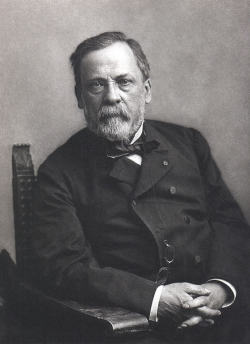Louis Pasteur

- Born
- 27 December 1822
- Died
- 28 September 1895 (age 72)
Louis Pasteur was a French chemist and biologist whose discoveries contributed to establishing the germ theory of disease and he invented the process of pasteurisation. He contributed to science, technology and medicine, pioneering the study of molecular asymmetry, developing pasteurisation and developing vaccines against anthrax and rabies.
Pasteur was born in France, and was a gifted painter. His portraits of his parents and friends are on display in the Pasteur Institute. He received a bachelor of arts degree in 1840, and a bachelor of science degree in 1842 from the Royal College of Besancon in Paris.
Pasteur was appointed professor of chemistry at the University of Lille after several years of research and teaching in Dijon and Strasburg. He obtained a masters of science in 1845, and then received an advanced degree in physical sciences. He obtained a doctorate in sciences in 1847. He was appointed professor of physics at Dijon Lycee which was a secondary school, but soon after he accepted a position as professor of chemistry at the University of Strasbourg. He married Marie Laurent in 1849, and they had five children, however only two survived into adulthood.
He followed up work by other scientists, such as Redi and Pouchet, and demonstrated that micro-organisms could not spontaneously generate, even when air was present. Pasteur proved they were introduced from the environment by making a glass container with a swan neck where air could enter, but micro-organisms could not. This idea had been disputed by scientists who at the time supported the theory that living things could spontaneously generate from non-living matter. In 1984 the French Academy of Sciences accepted Pasteur’s results.
Pasteur also demonstrated that micro-organisms were responsible for souring wine and beer. He developed the process of pasteurisation, removing the bacteria from the liquid by boiling and then cooling the liquid.
In 1895 Pasteur was the director of scientific studies at the Ecole Normale, and was invited to aid investigation into the causes of an epidemic disease in silk worms. He identified a parasitic infection causing the epidemic, and selected only the disease- free eggs for breeding silk worms, saving the silk industry.
Pastuer then continued to investigate the germ theory of disease, and extended his theory to the causes of anthrax, cholera, smallpox and TB and aid their prevention by vaccination.
Science knows no country, because knowledge belongs to humanity, and is the torch which illuminates the world. Science is the highest personification of the nation because that nation will remain the first which carries the furthest the works of thought and intelligence.
Pasteur is best well known for his revolutionary work on rabies. Due to his continued discoveries and research, a special institute for the treatment of diseases was founded in 1888, the Institut Pasteur. Pasteur was the director for the Institute until he died. He was considered a national hero and was given a state funeral in 1895.



